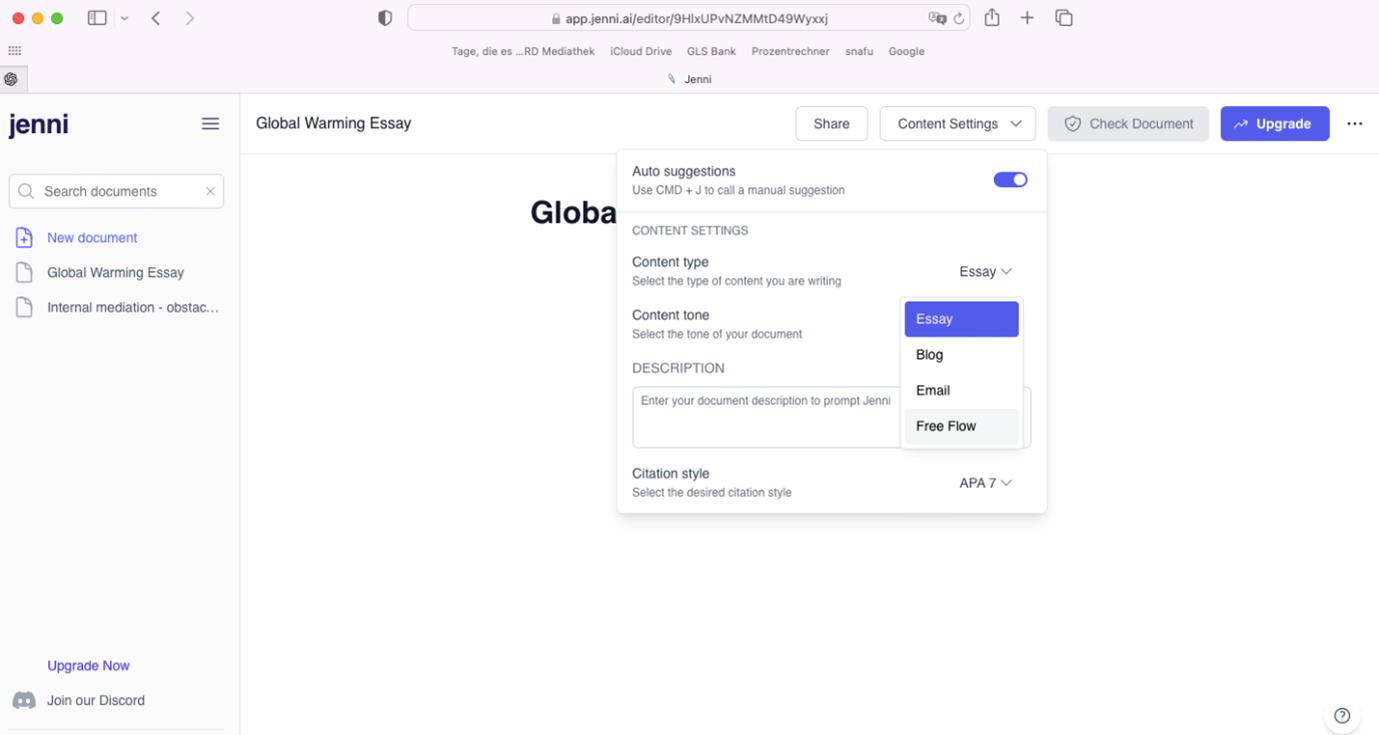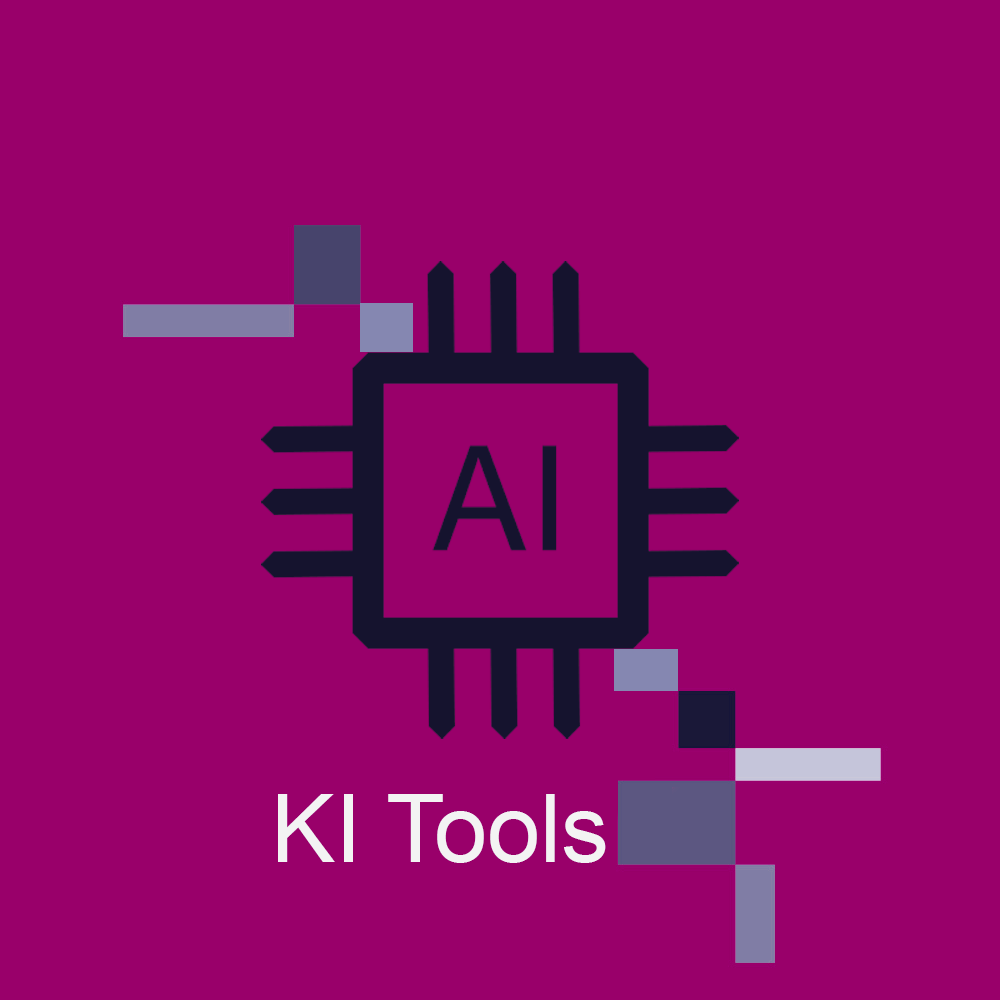With the "Deus Ex Machina? — Testing AI Tools"-series we want to show you different tools, that aim to simplify writing, design and research by using Artificial Intelligence. More on the "Deus Ex Machina?"-series can be found here.
A contribution by Journalist-in-Residence Bettina Friedrich and Anna Köhler
Overview
"You Write, Jenni Completes" — that is the motto of Jenni.ai. The AI writing assistant helps you to write faster and more efficiently. While writing, the program generates suggestions on how a text could continue and the human behind the keyboard either agrees (the program then generates the next paragraph of text) or disagrees (the program then writes a new suggestion).
Jenni.ai offers five functions: (1) The main function is a text generator called "AI Autocomplete". (2) You can choose between different types of texts (essay, blog post, email and FreeFlow) and between different writing styles (friendly, professional, academic, persuasive, factual). (3) The program can paraphrase and rewrite. (4) A citation function with the option to insert your own citations or have Jenni.ai find supporting documents, which can then be inserted in the text in various academic citation styles (Harvard, MLA 9 or APA 7). (5) A plagiarism check for the self-written text and the text created by Jenni.ai. However, this is only included in the paid version and was therefore not tested. Logging in works either via one's own Google account or with an email address. Whether the program reads data from the interaction with the user is not made transparent.

The AI behind the application
The company claims on its website that Jenni.ai is used by writers from various university institutions (Cambridge, Harvard, Aston, MIT) as well as Meta and Google. According to its own information, the programme uses a combination of GPT‑4 as well as "custom data from each user". What that means exactly is not explained. The underlying source code/algorithm is also not published.
Since Jenni.ai works on the basis of the ChatGPT model 4, the same errors creep into its use that are found in these tools, too. Occasionally, Jenni.ai invents sources and information and passes them off as true. The current version also points out that although Jenni.ai has a built-in plagiarism checker, under certain circumstances the writing tool generates already existing phrases.
The rhetorical potential of the tool
The program is aimed at people who want to produce demanding and longer texts. It is easy to get the desired result: The program simply continues writing the texts the user has started. The task of the human behind the computer is to decide whether one wants to keep a text passage or whether the AI should generate a new suggestion. Since Jenni.ai writes virtually "by itself", writer's block can be eliminated.
Rhetorically, Jenni.ai is a step ahead of other writing tools especially in its adaptability to personal styles and the tone of a desired text. The fact that writers are actively involved in the creation process and can intervene in every step of the text generation also makes Jenni.ai one of the most customizable AI-supported writing assistants. Texts also sound less generic for these reasons. During the test, however, it was noticeable that one not only has the option to give Jenni.ai new input, but it is often necessary to do so. In Free Flow mode, for example, Jenni output several phrase variations of the same content instead of automatically switching from the introduction to the main part in the test essay:
"Ice volcanoes have been a topic of interest for scientists as they provide valuable information on the internal structure and composition of moons in our solar system."
"Additionally, we will explore the potential implications of ice volcanoes for future space exploration and our understanding of the origin and evolution of our solar system."
"In this essay, we will delve into the fascinating world of ice volcanoes and explore their significance in understanding our universe."
"Join us on a journey of discovery as we explore the wondrous world of ice volcanoes and unlock the secrets they hold about our universe."
Jenni.ai has suggested these phrases at small intervals for the test essay. Although the phrases do not follow each other directly, they repeat themselves every two to three sentences, which is why manual intervention in the writing process is indispensable. Jenni.ai therefore does not automatically provide a clear structure for a text; this must be introduced manually into the respective texts through appropriate key phrases.
Another function of Jenni.ai is to quote not only from the internet, but also from scientific journals. This in turn can lend more credibility to information, as the "knowledge authority" of the authors of the scientific articles can be transferred from the journals to the texts written with Jenni.ai. Furthermore, the program offers the "AskJenni" function to paraphrase sections for certain groups of people (in a self-experiment, for example, "paraphrasing for university students" was suggested as an option, i.e., adapting the text to the level of knowledge of university students in order to promote text comprehension), to write a summary for a paragraph or to formulate a counterargument. By formulating counterarguments, a topic can thus be looked at from several angles and give an indication for the person writing which contents might become controversial and therefore need more attention.
Usage in science communication
A big advantage for science communication is the fast production of texts and the different writing styles Jenni.ai offers. Before the text generating starts, the programme asks from which position one is writing — from that of a student, a PhD student or a journalist, for example. The selection of the "content tone", i.e., the linguistic tone of the output text between professional, friendly, brash, academic and persuasive, can also contribute to the personalization of the texts and thus adapt texts to selected science communication formats. Jenni.ai is particularly helpful for text-heavy formats — for example, science blogs, essays or newspaper articles — and can promote the flow of writing. The fact that writers can insert their own sources into the tool is particularly handy for scientists who have already done research. Reviews of the program also state that Jenni.ai learns from its users and adapts to the writers' writing style over time.
Wrap-Up
Even Jenni.ai is not spared from filler words and standardized phrases. While this option often works — some phrases are, after all, standard for a reason — there are occasions when creativity in writing is called for.
Overall, Jenni.ai is a very practical tool that actively supports the writing process right as it happens and can be quite effective against writer's block. At the same time, there remains the need to check the produced texts for accuracy. Since Jenni.ai works on the basis of the ChatGPT model 4, the same errors that can be found in this tool occasionally sneak their way into Jenni.ai, too.





